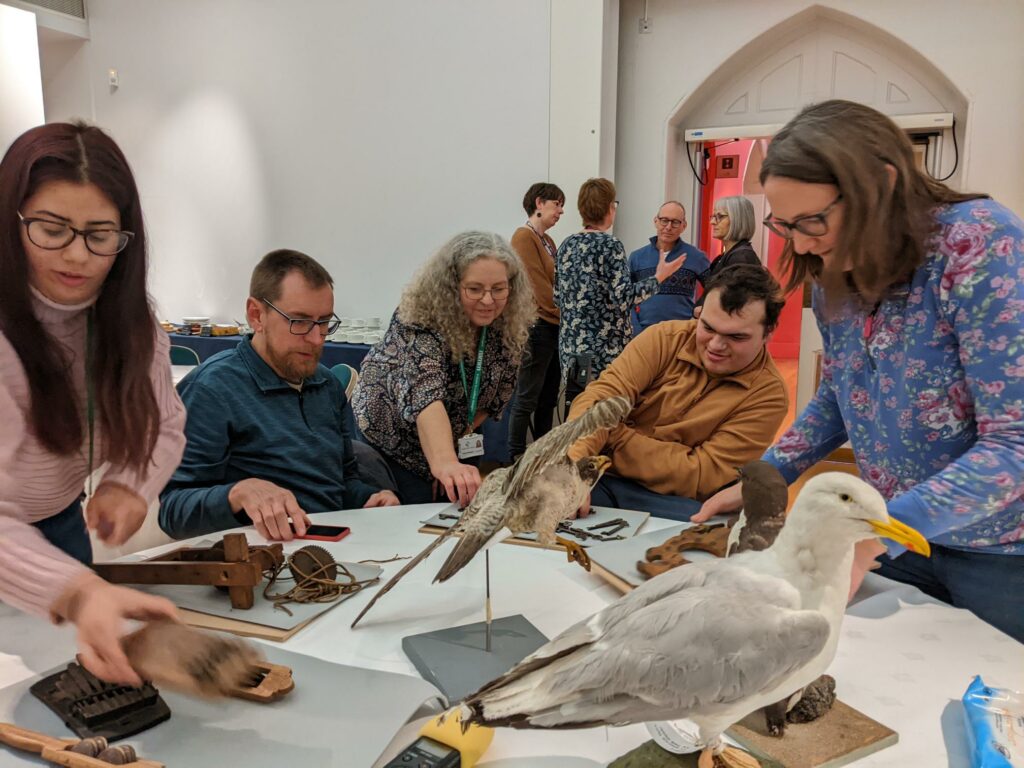A collaboration to create an audio resource with and for people with disabilities
Sound Journey was developed as a direct response to the impacts of the Covid-19 pandemic, which particularly affected vulnerable adults in terms of their wellbeing and mental health. The project created an opportunity for socialising and networking, easing isolation and providing a space where individuals could connect, as part of a community with a shared purpose to have fun and be creative together.
Sound Journey is a collection of sound pieces made in collaboration with sound artist Gemma Nash and local people with disabilities. Content for the sound pieces was created through a series of immersive online, and in person, workshops led by local creative practitioners. The sessions were used to draw out stories, views, ideas and reactions from the participant groups in relation to RAMM’s collection. There was always a creative element to the session, whether it was creating a map based on the buildings that the organisations operate from, making a musical necklace, or designing a building that could move around the city.
For the online sessions, the creative practitioners also sent out pre-session packs of provocations and materials to the participants, so that everyone started out with the same set of creative tools. It was a new way of working for RAMM and the creative practitioners trying to deliver creative workshops virtually and everyone in the project learnt from their experience along the way.

The project team worked with lead disabled artist, Gemma Nash to direct and shape the project. The project focussed broadly on the theme of ‘Movement’, looking at our bodies in space and time, how they articulate and transport us. We also explored this theme in relation to non-humans, objects, textiles and how these things, and their component parts, may move. In addition, participants were inspired to think about objects’ journeys to the city, to the building, and to the case they now inhabit.
As our project partners: Magic Carpet, Pelican Project, CEDA and Learn to Live: 19-25 facilitated links with the disabled community, supporting the sessions with their groups and providing guidance on how best to serve and support their needs.
Feedback so far…
“I like this now.” Comment from a member of Pelican Project about how his experience of the museum has changed while listening to Sound Journey.
“CEDA really enjoyed the musical aspect of the finished work, it really engaged lots of the participants. They focused on the sounds that they were hearing and enjoyed this as a new layer to their experience in the gallery spaces.” Comment from CEDA (one of the partner organisations).
“The Clare Milne Trust was delighted to support the Sound Journey project. The Trustees felt that the involvement of many well respected local charities, working with groups who support people with a disability, would create an exciting and innovative guide to the museum, embracing the importance of the visits being more accessible, engaging and also very enjoyable for people with a disability.” The Clare Milne Trust
What next?
The final work is available for visitors to access (in person and remotely) to support their journey through RAMM’s spaces. We hope that the work inspires new ways of thinking about objects, based on the creative responses of people with a diverse range of abilities and experiences. Each of the sound pieces relates to a specific object in the museum, and are a combination of sound effects, snippets of conversation, stories and thoughts brought together to create ambient soundscapes.
The facts
Around 20% of Exeter’s residents live with a disability, according to Devon County Council statistics. It can be more challenging for people with disabilities and their carers to access cultural and heritage organisations. Paid carers’ shifts rarely allow time for planning activities to overcome potential obstacles, and trying new places can be daunting if they are unsure about the provision and accessibility of a new space.
RAMM is working with local partners to become reliably accessible. There are level surfaces into and around the whole building, lifts large enough to accommodate wheelchairs, spacious gender-neutral toilets, and consideration of accessibility has gone into designing signs, displays and online materials. However, there is always more that we can learn and implement to ensure that we show we are listening to our audiences with disabilities.
RAMM champions accessibility and as an organisation, and is always looking for ways to make our building and resources more welcoming to individuals with learning and physical disabilities. RAMM is open to co-creation approaches and believe that the best way of achieving this is to ask for the input and expertise of people with lived experience of disability.
Further information
A postcard with information about the project and a link to the sound pieces is available to pick up from one of our Reception desks. The sound pieces can also be accessed here. Stream Royal Albert Memorial Museum & Art Gallery, Exeter | Listen to Sound Journey playlist online for free on SoundCloud
For more information please contact:
Ellie Coleman
Engagement Officer, RAMM

